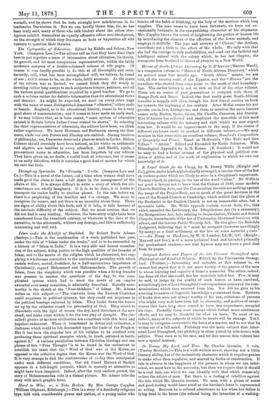Islam under the Khalifs of Baghdad. By Robert Dune Adams.
(Seeleys.)—This is the continuation of a work published last year,
under the title of "Islam under the Arabs," and is to be succeeded by a history of "Islam in India." It is a very able and honest examina- tion of the subject, doing justice to the high qualities of the founder of Islam, and to the merits of the religion which he elaborated, but sup- plying a wholesome corrective to the sentimental partiality with which certain writers, moved, doubtless, by a half-unconscious impatience of
Christianity, regard Mahommod and Mahommedans. The growth of Islam, from the simplicity which was possible when a living founder was present to answer the questions of the day, to the com- plicated system which had to meet the needs of an empire extended over many countries, is admirably described. Equally note- worthy is the sketch of the "Free-thinkers" of Islam. Mr. Adams writes on this subject :—" The converts from the Eastern Churches could acquiesce in political tyranny, but they could not acquiesce in the political bondage enforced by Islam. They broke down the fences set up by the orthodox round the personality of God. They strove to illuminate with the light of reason the dry, hard doctrines of the new creed, and make room within it for the free play of thought. The (so- called) glories of modern civilisation are coincident with this brief and hopeless endeavour. When it terminated in defeat and extinction, a 'darkness which could be felt descended upon the lands of the Prophet. But it has been the singular fate of his religion to be credited with producing those spiritual energies which, in truth, perished in battle against it." A curious parallelism between Christian theology and one phrase of this "Free Thought "is to be found in the endeavour to establish the tenet that the " Word of God' was in the Koran, as opposed to the orthodox dogma that the Koran was the Word of God. It is very strange to find tho controversies of to-day thus anticipated under such different conditions. Our old friend Haroun al Rashid appears in a full-length portrait, which is scarcely so attractive as 'night have been imagined. Indeed, after the very earliest period, the story of Mohammmedan rule is a dismal picture. Mr. Adams tells the story with much graphic force.






































 Previous page
Previous page